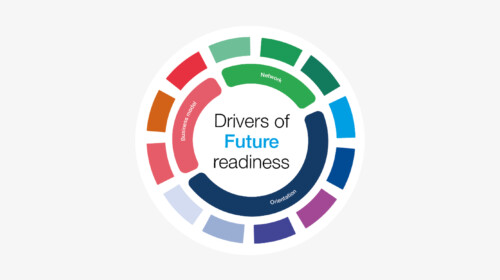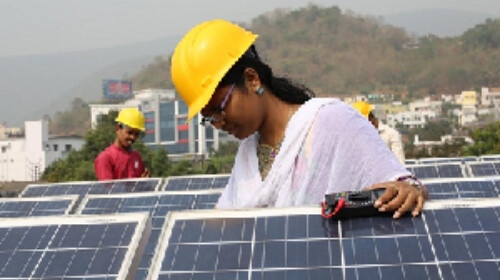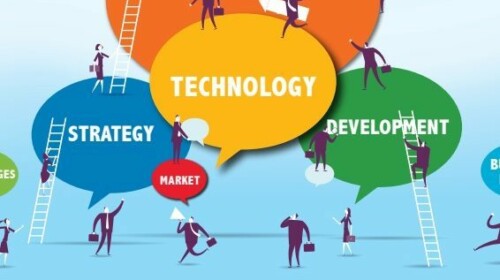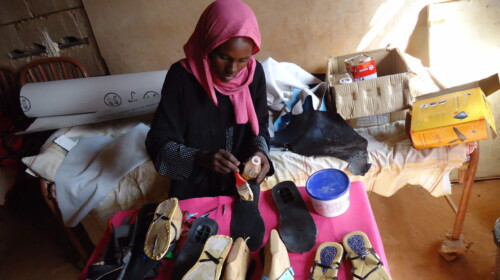Businesses are facing increasingly complex and transnational challenges. These include the growing impacts of climate change, technological disruption, socioeconomic stratification and related social unrest, the rise of conflict and its ripple effects on energy and food security, as well as changing expectations about the role of business in society. As we imagine the future, it is critical to understand how companies of all sizes can build their resilience to these shocks, seize opportunities that might arise from such shifts and enhance their ability to generate long-term and sustainable value.
SMEs represent around 90% of all firms worldwide, employ roughly 70% of the global workforce and, by some estimates, contribute up to 70% of global GDP. Unlike larger corporations, their size makes them more agile in producing and integrating innovations. These businesses play significant roles – not only in the global economy and labour markets – but also in enabling and shaping the nature of innovation within those markets. Despite their unique contributions, SMEs also face specific challenges, often closely tied to their survival, that have not been widely examined within the context of their future readiness. While SMEs can benefit from higher degrees of speed and agility, they can face constraints due to their smaller size and resource access. Given these challenges and opportunities, it is important to better understand the role and positioning of SMEs in creating and maintaining momentum to achieve widespread positive social, environmental and economic change, not only today, but most importantly, for the long-term future. This requires SMEs to support sustainability broadly but also to ensure their environmental, social and governance (ESG) objectives are centralized within broader business strategy and, ideally, linked to the targets of the Sustainable Development Goals (SDGs).
To enable SMEs and mid-sized companies to improve their chances of success while generating a positive impact in the future, they need to be future-ready. The ability to identify opportunities to enhance future readiness not only supports SMEs themselves, but society as a whole, in terms of job creation, inclusive growth, sustainable development, or all three. Future readiness is defined by the World Economic Forum as a set of organizational capabilities and orientations that enable companies to successfully respond to shocks and seize opportunities that emerge from constant disruption. To develop a comprehensive understanding of future readiness, the Forum applied several research methodologies and identified the following as the three core characteristics of future-ready SMEs: the ability to generate sustained growth; the ability to have a positive social and environmental impact; and the ability to remain resilient and agile in times of volatility. The Forum’s research also identifies three key drivers of future-readiness which include 1) orientation, the culture and style through which important decisions are taken, 2) business model flexibility and 3) the ability to establish and tap into valuable networks and connections. The Forum provides access to a self-assessment tool for SMEs to benchmark their future-readiness in comparison to their peers. This can be accessed here.
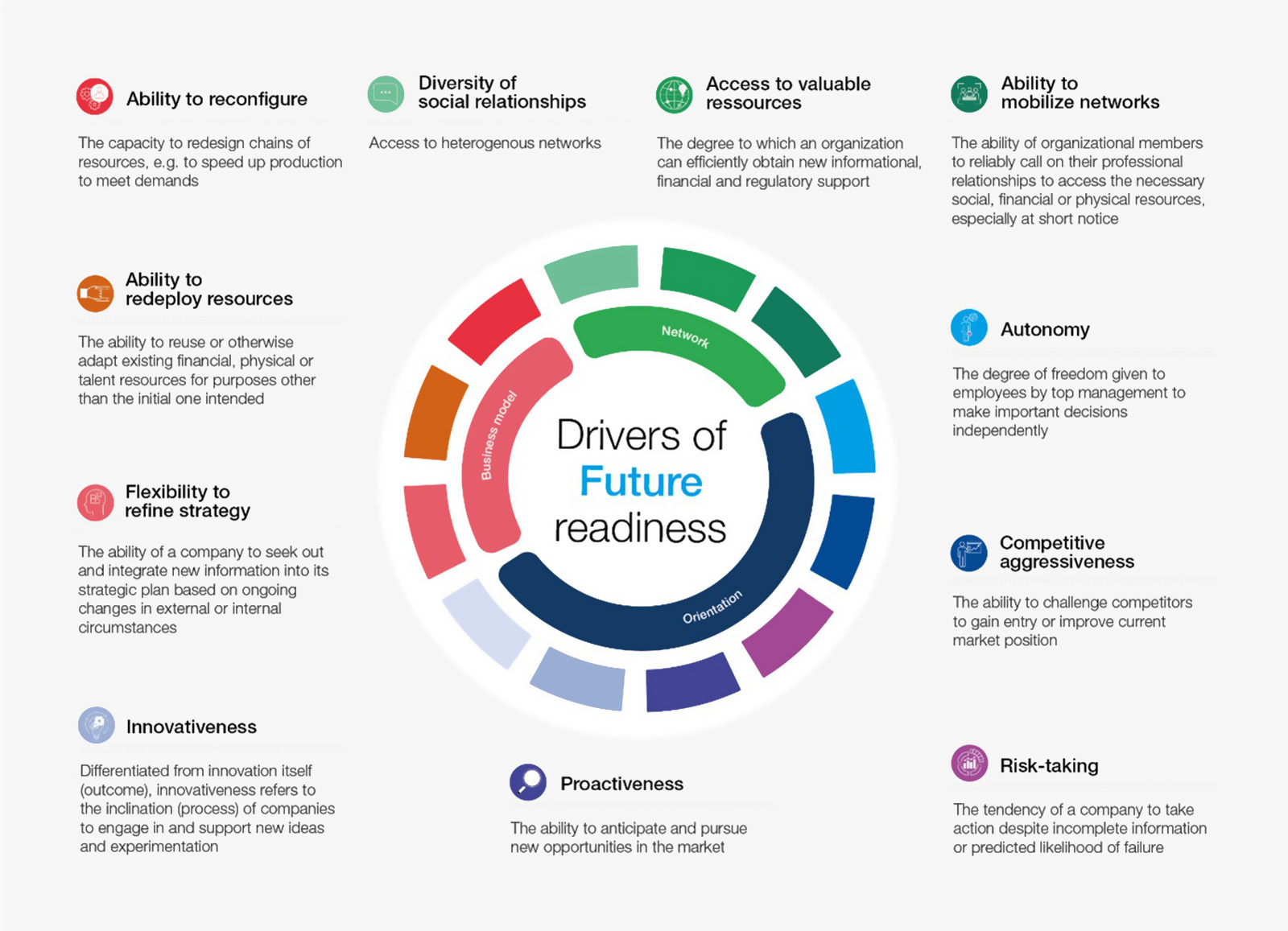
In addition to these efforts, in 2020, UpLink, the open innovation platform of the World Economic Forum was launched with the mission to create bridges within the innovation ecosystem for entrepreneurs to connect to investors, corporates, experts, and other organizations they need to scale. UpLink has been crucial in supporting and helping its Top Innovators scale such as:
As the examples above illustrate, SMEs prioritizing societal impact can realise competitive advantages through this approach. In similar cases, sustainability concerns could form the key purpose of the business or, if not, may need to be relocated from a corporate social responsibility-style role to a central strategic consideration by upper management. Such a move would be proactive relative to climate change-related legislation (in the case of reducing carbon emissions), would offer opportunities for reputational enhancement, including through sustainability certification (such as signing the UN Global Compact or becoming a B Corp-certified corporation) and may offer access to a growing international network of organizations similarly aligned towards creating positive societal impact through their company’s orientation and business model.
Given the huge impact COVID-19 has had on small businesses and the ongoing fallout from Russia’s invasion of Ukraine, SMEs have found themselves in a state of simply needing to survive and other objectives have fallen by the wayside. This survivalist mindset has, for example, reduced the focus on the societal impact for SMEs. In addition, many SMEs may feel underprepared to engage in sustainable practices or believe themselves to be too small to have much impact. Whereas some SMEs have sustainability as a core- or by-product of their business model, others believe they don’t have the resources (financial and/or knowledge) to make this leap and are often not sure where to begin – the challenge can feel overwhelming. However, proactively addressing sustainability through innovative products or services can serve as a way to tap into new markets and minimize the increasing regulatory risks associated with not doing so. Younger workers have also shown a growing preference for engaging with mission-led companies that focus on positive societal impact. Embracing the potential strategic advantages of positive societal impact in this way offers multiple value-creating routes as well as an opportunity to gain reputational benefits as champions of the implementation of sustainability strategies. Finally, embracing sustainability and adopting future-readiness can unlock access to capital. SMEs often face a problem with securing the capital they need and, increasingly, environmental, social and governance (ESG) standards are integral to that process. Aligning with broader social and economic development goals set by governments and investors can unlock new opportunities offered by start-up accelerators, incubators and venture capitalists. Government grants are also increasingly available for companies that help a nation or region move closer to established sustainability goals.
Future-ready SMEs will need business models that affect society positively in line with ESG goals and this requires them to place such sustainability at the centre of their business strategies, with the payoffs potentially being talent acquisition and retention, access to capital and alignment with regulatory protocols and broader sustainable development goals.
* Ms. Bryonie Guthrie is on the Strategic Intelligence team at the World Economic Forum in Geneva, Switzerland. Her focus is public engagement, working closely with public sector institutions and international organisations to introduce them to the Strategic Intelligence platform and to support their priorities and objectives through access to expert insights and content on the platform. In addition, she is responsible for developing and managing content and partnerships for the platform. Prior to joining the Forum, Bryonie worked in the private equity field in Hong Kong, following completion of her diplomatic posting to the South African Consulate in Hong Kong and four years on the Africa Multilateral desk at DIRCO (South Africa’s Foreign Service) head office. Bryonie has over a decade of experience working with the public sector and governments, especially in the developing world. Bryonie studied her undergraduate degree in South Africa, at the University of Pretoria, and completed her Master’s Degree in Asian and International Relations at City University, Hong Kong.
Mr. Olivier Woeffray currently oversees private sector engagement with the World Economic Forum’s Strategic Intelligence platform. His background sits at the intersection of the private and public sector, developing tools and frameworks to help senior leadership make sense of complexity and shape the future of their organizations. Olivier led the development of one of the first workstreams of the World Economic Forum focused on Small and Medium Sized Enterprises, including the work on the Future Readiness of SMEs. He previously worked with the Organisation for Economic Co-operation and Development and the International Federation for Housing and Planning.



